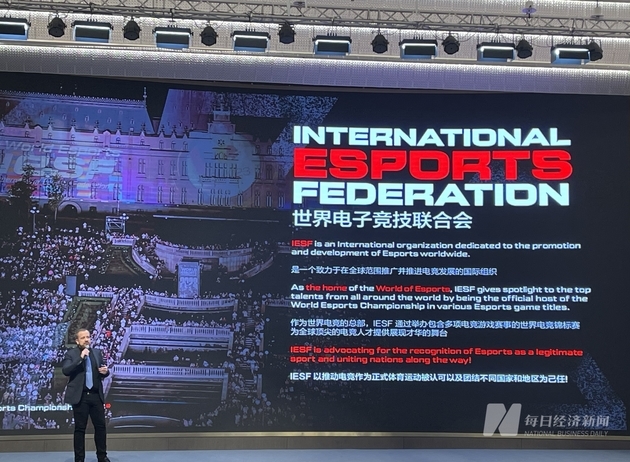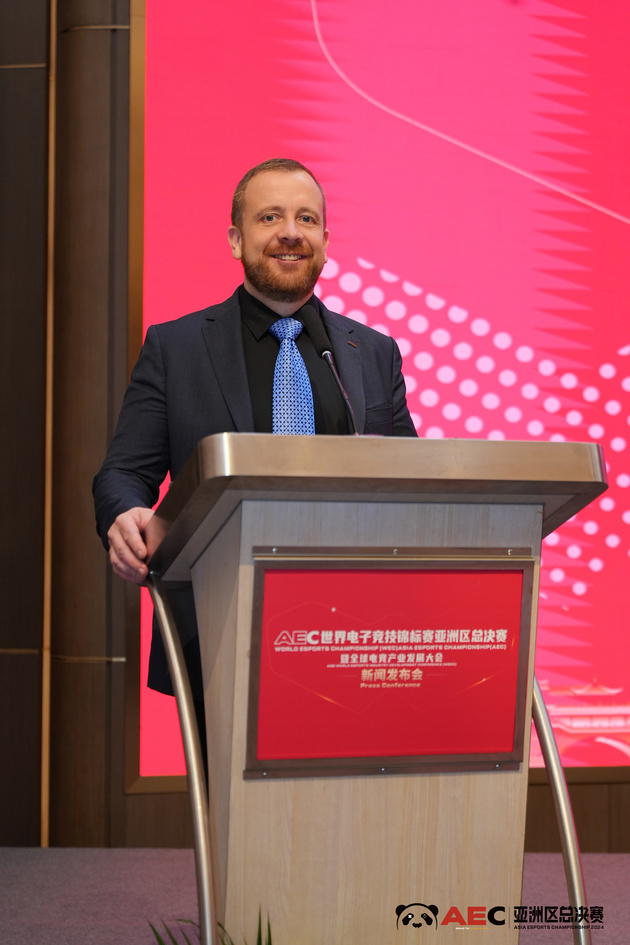On April 13th, the press conference of the World Esports Championship (WEC) Asia Esports Championship (AEC) and World Esports Industry Development Conference (WEDC) was held in Chengdu.
Before the conference began, Boban Totovski, Secretary-General of the International Esports Federation (IESF), accepted an interview with National Business Daily (NBD) on topics surrounding the development of the global esports industry, esports' inclusion in the Olympics, and IESF's promotion of esports.

Photo/Shi Puning (NBD)
Passion is Unique Asset of Asian Countries
NBD: Last September, esports made its official debut as a competitive event at the Asian Games, marking its entry into the arena of continental sports competitions. How do you evaluate the current development of esports on a global scale?
Boban Totovski: Esports has been rising constantly in the past 20 years. The more viewers, spectators and fans show up, the more value it gets and the more it attracts the eyes of the big companies and the bigger networks. This is not directly related to the development of esports, but it helps to boost the development of esports in the world.
We can see that there are differences in every continent, especially in Asia, because it's already an olympic event. The value is much different than just having an event that is not recognized by the government. Because the main difference is when you win an Olympic event, you're an Olympian. You come back home with the gold medal, same as same Bolt, same as anybody else that is on the Olympics. The good thing is that we can see a lot of true sports athletes being given that recognition.
The development of esports requires more than just progress at the top level, as it is already quite perfect at that level, with professional teams, professional tournaments, and everything running seamlessly. However, at the grassroots level, the ecosystem for amateur and semi-professional sports has not been well protected or well developed.
We're trying to improve that ecosystem and make sure we can protect the athletes from being used as assets in someone's marketing campaigns or someone tournaments just to gain traction and more viewership.

Photo/Provided by the organizer
NBD: This press conference marks IESF’s first official appearance in China. How do you view the development of China’s esports industry? What can IESF bring to the development of esports in China?
Boban Totovski: I have been quite a lot in Asia in the past 3 to 4 years, from Indonesia to the Philippines and now in China. I can see that the passion is a unique asset for the Asian countries and especially in China. And not only for the athletes, but for the spectators, for the fans. They are so respectful and they are so looking up to the athletes as their heroes, which is something that is really unique in this region. Not to mention the size of China, the source of the titles publishers; the rise of mobile gaming, which is becoming more and more part of his sports and China always is in the top countries winning gold medals. So like in in the world, they actually showcase their talent and how good athletes there is actually in china.
We are there for the athletes. We want to make better events. We need to the players to understand that playing on a computer 16 hours nonstop is not going to make you the best. The best althelets are not practising 16 or playing 16 to 18 hours a day. They have a regime: 2 hours of practice and you need to do a break. You need to do some physical exercise as something that we call responsible gaming.
This is something that we need to set up as a start and from there the more opportunities and competitions we create for the athletes under those rules. It's much easier because when you say you want to compete in the world championship, show me let's see your cardio. Let's see how healthy you are.
So there are ways that we can use these sports as a tool to actually get more a healthy lifestyle for our athletes. And this is something that I believe we need to do. And the most important thing is besides bringing us up here, bringing China to the world.
Esports Recognition as Legitimate Sport
NBD: Previously, the International Olympic Committee (IOC) stated that it would hold the first Esports Olympics in 2025 or at the latest by 2026. Has IESF had any contact and communication with the IOC? Currently, it seems that the selected events may mainly be virtual sports. In the future, will more esports events that players love be included?
Boban Totovski: The International Olympic Committee (IOC) has begun to gradually introduce virtual traditional sports events. In June last year, the first-ever Olympic Esports Week (OEW) was held in Singapore, which signifies progress. I know it doesn't include what actually sports is that most of the titles are sports simulations. I still believe that it's a way forward and it's good to see the IOC taking interest in the sports.
From our site as the international e-sports federation, we have created an e-sports leadership group that is communicating with the IOC to see how we can work together. So we have everything that IFC is requesting for ISF to be recognized by the FC now. It's a slow process. Can you imagine how long it took basketball and football to become proper sports? Does Esports has 20 years of history? So we are still young but moving forward to it.
There is some overlap, especially FIFA in Formula One in the same racing. But the differentiator is that what the esport is actually the person behind the device, whether it's a wheel, whether it's a mobile phone or PC this is a gamer. The one losing it, then it's esports. If I am a cyclist, a professional cyclist that drives through the France that can survive through the france. If I sit on a computer on a bicycle with the screen, I'm not a gamer. I'm still a cyclist. I'm just using digital means to facilitate the competition or virtual rowing.
Better understand these sports that these sports is not source of violence, is not source of negativity. It's actually a source of friendship. It's bringing cultures and people together. I've seen people from countries that don't speak to each other that they cannot go to each other because of politics. But in these sports they're competing against each other and they're competing together. This is a huge value that I believe that the entire world needs to embrace.
The road to the top is very difficult. If you have a proper like you have in football, in Ping Pong,in basketball, in every sport, you can go to a club in the city. They will give you the practice, the coach, the practice examples that educate you, the sports that doesn't exist.
People think gamer is someone that's sitting in the computer all the time and like geek, no social life, nothing. That's a paradigm that doesn't exist anymore. That was 20 years ago. The sports what people need to understand it and see that these sports actually huge too. This is the main thing that the eyes and wants to achieve.


 川公网安备 51019002001991号
川公网安备 51019002001991号





